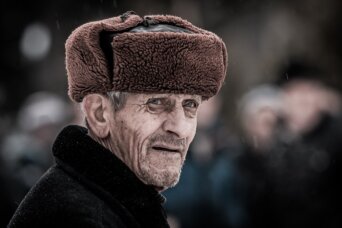- About
- Topics
- Picks
- Audio
- Story
- In-Depth
- Opinion
- News
- Donate
-
Signup for our newsletterOur Editors' Best Picks.Send
Read, Debate: Engage.

| topic: | Immigration |
|---|---|
| located: | Russia |
| editor: | Igor Serebryany |
Russia badly needs a constant inflow of immigrants to help its economy remain afloat, as the country has been experiencing an increasing shortage of the workforce, President Vladimir Putin said on Monday.
"This has been getting a real, objective restriction for the country's economic growth. This is one of the most serious problems," Putin told a meeting of his social-economic board.
The president, who the last week won a landslide ballot on the constitutional amendments which give him a possibility to stay in power until 2036, stressed that Russia welcomes migrants from the world over but would give preference to the Russian-speakers and the people "with the Russian mentality." He did not specify what the Russian mentality could mean.
Yet in October 2018, Putin signed a roadmap of the state migration policy. The document envisages inviting several millions of migrants to Russia until 2025.
Putin's intentions should be welcome, as an influx of immigrants would solve a lot of this country's economic, social and demographic problems, an expert in Moscow's Institute for Strategic Studies Igor Beloborodov says.
"It may sound politically incorrect but Russia's public opinion heartily welcomes naturalization of the Ukrainians, Belorussians and Moldavians while frowning incorporation of the immigrants of non-Caucasian origin. Ethnic Russians, in big numbers, feel uncomfortable even with the people from Northern Caucasus, which is, and has always been, a part of the Russian Federation. This is one of the paradoxes created by the dissolution of the Soviet Union that modern Russia includes ethnically 'alien' regions while millions of ethnic Russians live outside of Russia," he says.
Last October, Russia enacted a law cutting from three years down to one year a period required for foreign nationals working on certain occupations to apply for a Russian passport. The list of the occupations opening the fast lane to Russian citizenship includes 135 positions (up from 74 before), such as medical and veterinary professions, school teaching, journalism and even, for some reason, entomology.
If the Russian authorities expect the economic migrants to be predominantly Slavic, they will face a big disappointment, a professor in the Russian Presidential Academy of National Economy and Public Administration Alexander Shcherbakov warns. "All ethnic Russians in the former Soviet republics who wanted to move to Russia have already done so for 30 years after the collapse of the Soviet Union. Meanwhile, migrants of non-Russian origin are the inexhaustible pool to replenish the workforce in Russia. To render Russia more attractive for mass immigration, its authorities must offer better economic opportunities, not solely lowing barriers for obtaining a Russian passport," he is convinced.
He reminds us that since the programme of the relocation of the ethnic Russian has started, over 800 thousand people moved to this country and little more are left of the "Russian world" abroad.
The physical number of Russian speakers in the world is not enough to reverse the demographic tide in this country, head of the Institute for the Regional Problems Dmitry Zhuravlev agrees. "For many years, all declarations from Moscow that the motherland is waiting for its prodigal children contradicted the actual bureaucratic practice. Personally, I know lots of people in Kazakhstan, who once launched the process of repatriation to Russia but abandoned the enterprise half-way after they have faced scores of red ribbons on the Russian side. On the other hand, I travel extensively to the places where the newcomers settle in the Russian regions, and nearly 100 per cent of them are ethnic Uzbeks," he recalls.
Zheravlev is convinced that however big the inflow of newcomers is, it is still insufficient to solve Russian economic and demographic problems.
Image by Mihai Paraschiv
